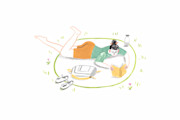Coming out is fraught both for parents and their LGBTQ+ children. Your child has likely carefully planned what they’ll say, perhaps they’ve even rehearsed it in front of the mirror or with a friend. They’ve probably been thinking about their sexuality for months or years. They’re coming to the conversation prepared.
You, however, might be caught off guard with no role models or examples to follow. It’s understandable that surprised parents are often tongue-tied or—worse—they utter something like “You can’t be! You just went on a date with Susie last weekend!” Or, “You’re just being influenced by the Hollywood celebrities who are always coming out!” Or the most dreaded of all, “It’s just a phase!”
This is about your child, not you
These responses smack of denial, “a defensive reaction that parents experience when first confronted with information that a child may be gay,” says Jonathan L. Tobkes, M.D., co-author of When Your Child Is Gay: What You Need To Know.
“This is neither a surprising nor dysfunctional instinct because the vast majority of parents do not have the expectation that their child will be gay.”
Your child will probably be exquisitely sensitive and looking for meaning in your word choice and tone in the weeks and months following their coming out.
Denial, “though understandable, is not the best response to your child,” says Tobkes. This response eclipses your child’s revelation of an important facet of themself. By contradicting them, you demonstrate you are not listening and that you think you know best. In this instance, the child knows best and should take the lead. You should trust them to know who they are and how they feel.
What your child wants you to say
Your child wants to know that they’re still your kid, and that you won’t reject them. The best response is one of love and acceptance.
Below are some examples that may help:
“I love you and will always stand by you.”
“Thank you for telling me. I’m proud that you have the presence at your age to come out. It shows confidence, honesty, and self-awareness.”
“Are you planning on telling other relatives? Do you want my help?”
“Do your siblings know? Did you tell them first or did they find out another way?”
Apologize if you blew it
If you were blindsided by your child’s coming out and you wish you could retract what you said, apologize.
Dr. Tobkes suggests that you start the conversation with something like, “I am so sorry I reacted like that when you came out. I deeply regret saying those things and feel horrible that I hurt you.”
“It’s OK to admit that it was a big shock,” says Dr. Tobkes, but your priority has to be your child’s well-being.
Your child will probably be exquisitely sensitive and looking for meaning in your word choice and tone in the weeks and months following their coming out. Remind your child of what you like about them and what you admire in them. After all, it’s still the same person with the same attributes as before they came out to you. Being gay should have no effect on your “opinion” of them.

Actions speak louder than words
You can show your child that you’re an ally by attending a support group with them. The PFLAG Chapter Network (formerly known as Parents and Friends of Lesbians and Gays) has over 400 chapters across the country, providing confidential peer support, education, online outreach, and advocacy to the LGBTQ+ population and their families.
You can also show your support by actively educating yourself. Look for memoirs written by straight parents of LGBTQ+ children and instructional books by psychologists who specialize in children’s and family therapy. If your child is coming out as transgender or non-binary, ask them if they would like to discuss any medical concerns, and do your research on those issues.
But remember that even though you’re the parent, your child should take the lead and educate you. This is one area in which they know more than you!
If you can’t accept it
Even if you want to be understanding and supportive, your feelings may take a while to catch up. There is no timetable for this journey.
Perhaps you don’t have any friends or relatives whom you know to be gay, and all your images of gay life are from outdated movies and TV. Or perhaps your religion says homosexuality is morally wrong. Maybe you’re from a country where being gay is an actual crime.
There are many reasons you might not want to accept that your child is gay. Take your own upset and deal with it privately.
Look for a therapist who can offer support and guidance. It’s not uncommon for therapists to specialize in LGBTQ+ issues, so be sure to find someone who knows what they are doing.
The power of parents
Kids need their parents, and LGBTQ+ kids are no different. The Family Acceptance Project at San Francisco State University conducted research that shows that LGBTQ+ kids who are not supported by their parents are at higher risk for truancy, substance abuse, unsafe sexual behavior, depression, and suicide.
In fact, in the study, 18.5% of participants with highly accepting families reported suicidal thoughts in the past six months; compare that to the nearly 50% of participants who reported low familial acceptance.
It is estimated that approximately 40% of homeless kids living on the street are rejected by their parents for their sexual orientation, and that 62% of LGBTQ+ homeless youth have attempted suicide.
What you say and do right now can have a long-term effect on your relationship with your child.
According to Dr. Tobkes, “Even if you are just beginning your journey toward acceptance, you can and should show to your child in both words and actions that you will love and support them unconditionally.
Doing so will keep the lines of communication open between you and your child so that you can gain a better understanding of your child’s sexuality and ultimately arrive at a true acceptance of it.”

Don’t let denial get in the way
When a parent reacts with denial, their child feels that they themselves have been denied. That child is unlikely to keep their parents in the loop on the future developments in their life. They don't believe you hear them. Don’t ask them if they’re sure they’re gay, or try to change their sexuality because it makes you feel more comfortable.
Let go of your expectations for your child’s heterosexual life. No longer can parents assume what their child’s sexual orientation will be, nor that their child will keep it hidden.
What you say and do right now can have a long-term effect on your relationship with your child. Remember that your child came out because they love you and are seeking a more honest, open relationship. Children adjust better when parents are the loudest advocates.
For more resources on supporting your child, see the Family Acceptance Project’s Family Education Information.
Supportive families, healthy children | Family Acceptance Project . (2009). Retrieved from [PDF] https://familyproject.sfsu.edu/sites/default/files/FAP_English%20Booklet_pst.pdf
Youth Homelessness | The Trevor Project. (2018, July 9). Retrieved from: https://www.thetrevorproject.org/get-involved/trevor-advocacy/homelessness/






